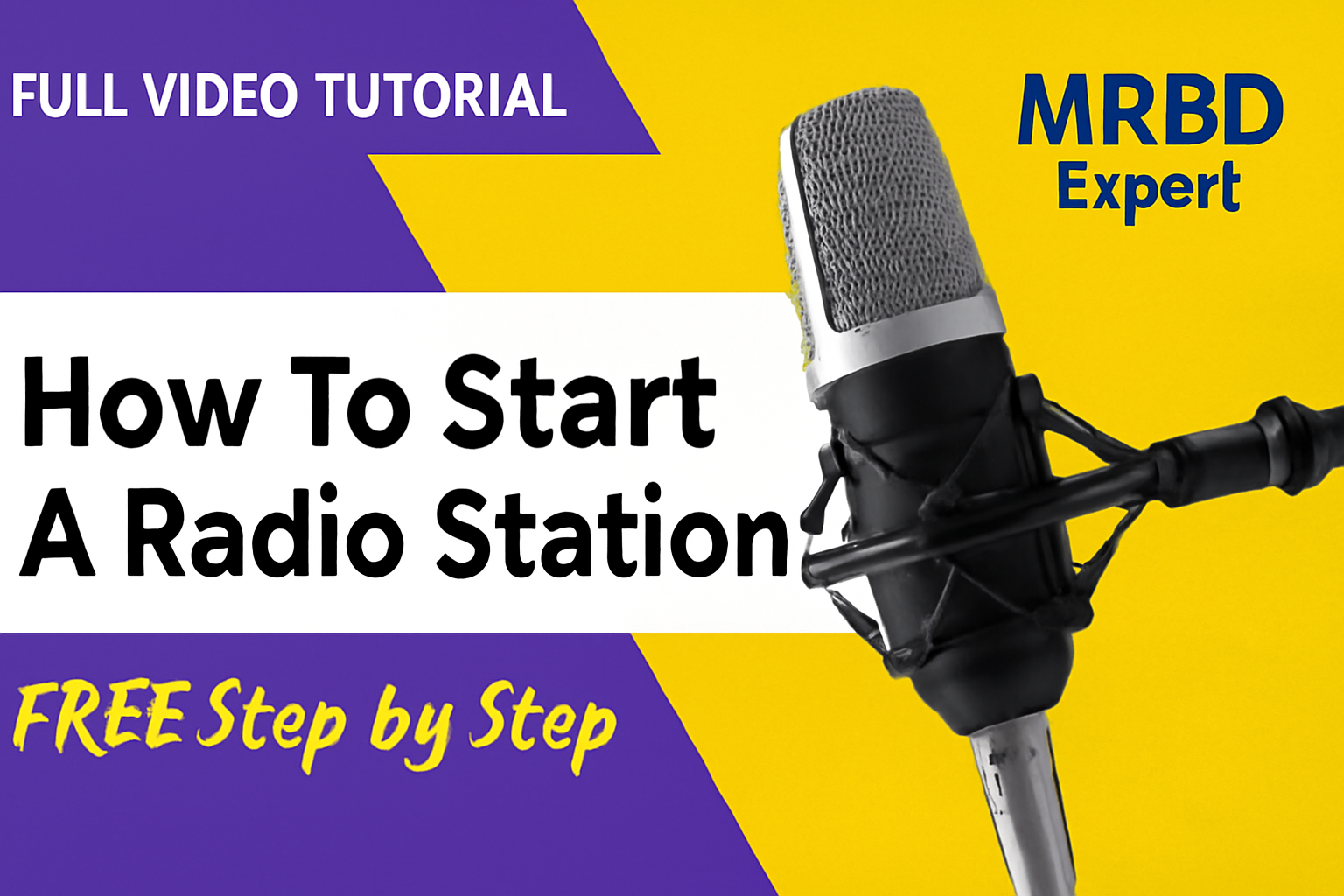Imagine hearing your song playing on a UK radio station, reaching thousands of eager ears. It’s not just a dream; it’s a real possibility that can elevate your music career to new heights.
You have the talent, the passion, and the drive. But how do you bridge the gap between your hard work in the studio and having your music broadcast across the UK? You’ll discover practical steps and insider tips to get your music featured on UK radio stations.
Whether you’re an emerging artist or a seasoned musician, understanding this process can open doors you never thought possible. Keep reading to unlock the secrets that can transform your music from a hidden gem to a nationwide hit.
Research Target Stations
Getting your music on UK radio stations can boost your career. A key step is researching target stations. Focus on those that match your style and audience. This helps you connect with listeners who appreciate your sound. Know the stations that play your genre. Understand their format. This increases your chances of getting featured.
Identify Genre-specific Stations
Not all stations play every type of music. Some focus on pop, others on rock or jazz. Identify stations that fit your genre. Listen to their shows. Pay attention to the songs they play. This helps you know if your music suits them. Check their playlist history. Look at their social media pages. This gives clues about their preferences. Knowing your target station’s genre is crucial.
Understand Station Formats
Each station has its own format. This affects the music they play. Some prefer new releases. Others mix classics with new tracks. Learn about their format. Listen to a few shows. Note the time slots and show types. This helps you see where your music fits. Formats also guide how they present songs. Knowing this helps you tailor your approach. Adapt your submission to fit their style.
Prepare Your Music
Getting your music featured on UK radio stations requires preparation. Your music must be polished and ready for broadcast. This means focusing on the quality of your recordings and your press kit. These elements help you stand out to radio producers and DJs.
Ensure High-quality Recordings
Your music must have high-quality recordings. Radio stations expect professional sound. Invest in good recording equipment. If needed, hire a skilled audio engineer. A clean sound grabs attention. Make sure your tracks are mixed and mastered well. This enhances the listening experience. Poor quality will hinder your chances.
Create A Professional Press Kit
A press kit is your music’s resume. It provides essential information about you and your music. Include a short biography. Add details about your musical journey. Share high-resolution photos. Upload your best tracks. Share links to your social media and website. A well-organized press kit shows professionalism. It helps stations know you better.
Build Relationships
Building relationships is the cornerstone of getting your music featured on UK radio stations. Establishing connections with key players in the industry can open doors to opportunities you might not have imagined. From sparking conversations with DJs to engaging with producers, your ability to create and maintain relationships can significantly impact your music journey.
Network With Djs And Producers
Getting to know DJs and producers can be incredibly rewarding. Start by attending music events, gigs, and festivals where these industry professionals are likely to be present. Introduce yourself and express genuine interest in their work. Share your music, but don’t just focus on self-promotion. Instead, ask them about their current projects or what excites them in the music scene.
Consider sending personalized emails to DJs and producers. Highlight your music’s unique aspects that might appeal to their style. Once, I reached out to a producer whose work I admired, mentioning a specific track that inspired me. This opened a dialogue that led to my song being played on their radio show. Such personal connections can make a lasting impression.
Engage On Social Media
Social media is a powerful tool for building relationships. Connect with DJs, producers, and radio stations on platforms like Twitter and Instagram. Follow their accounts and engage with their content. Comment thoughtfully on their posts, retweet their announcements, and show appreciation for their work.
Your interactions shouldn’t just be about promoting your music. Share relevant news, insights, or trends in the industry. I once shared an article about a new music genre that piqued the interest of a DJ I followed. This led to a conversation and eventually a feature on their radio station. Think about how you can add value to their online presence.
Consistency is key. Regularly engaging with industry professionals on social media keeps you on their radar. Are you actively participating in conversations that matter to them? Your genuine interest could lead to collaboration opportunities or recommendations within their network.
Craft A Compelling Pitch
Crafting a compelling pitch is essential for getting your music on UK radio. Highlight your unique sound and story. Engage station managers with a brief, catchy introduction and standout tracks.
Crafting a compelling pitch is crucial if you want to get your music featured on UK radio stations. A well-crafted pitch grabs attention and makes your music irresistible to radio hosts. It’s your first impression, and you want it to be memorable. Just like a catchy chorus, your pitch should stick in the minds of those who receive it. Personalizing your message and highlighting your unique selling points are key elements to making your pitch stand out.
Personalize Your Message
Tailor your message to the specific radio station and show. Research the station’s style and audience to make your pitch relevant. Mention why your music fits their playlist and how it can engage their listeners. Address the recipient by name. A generic “Dear Radio Station” won’t cut it. Show that you have done your homework and understand what the station is about. Relate your music to the content they currently play. This connection demonstrates that you are not just sending out mass emails but genuinely believe your music belongs on their station.
Highlight Unique Selling Points
Identify what makes your music different. Is it your innovative sound, heartfelt lyrics, or a collaboration with a known artist? Be clear about why your music is worth airing. Provide a brief backstory or interesting fact about your track. Did you record it in an unusual location or with a unique method? These details can pique interest and make your pitch memorable. Include any achievements or recognition your music has received. Awards, chart positions, or endorsements can add credibility and entice radio stations to give your track a spin. Your pitch is your introduction, your handshake, and your business card—all rolled into one. Make it count by being personal and showcasing what sets your music apart. If you were a radio host, what kind of pitch would make you hit play?
Utilize Music Platforms
Utilizing music platforms is a smart strategy to get your tracks noticed by UK radio stations. These platforms are a bridge between you and the vast world of music producers, DJs, and station managers. By tapping into these resources, you amplify your chances of getting airtime. It’s about being strategic with where you place your music. Have you explored all the avenues available?
Submit To Online Radio Platforms
Online radio platforms are an excellent way to reach a broader audience. Many have submission processes tailored for new artists. For example, BBC Music Introducing allows you to upload your music directly. This platform has helped countless artists break into mainstream radio. Make sure your track is polished and your submission is professional. An engaging bio can also pique interest.
Leverage Music Blogs And Magazines
Music blogs and magazines are powerful tools in the music industry. They often feature new artists, providing exposure and credibility. Reach out to blogs that focus on your genre. A positive review or feature can catch the attention of radio stations. Consider submitting a press release or offering an exclusive track. Personalize your pitch to each publication—generic messages often go ignored.
These strategies are just a starting point. Consistency and creativity in your approach are key. Have you considered how you can stand out in a sea of submissions? The right music platform might be your ticket to radio success.
Credit: www.facebook.com
Timing Your Submission
Submitting your music at the right time can boost your chances of being featured on UK radio stations. Align submissions with station schedules for optimal visibility. Consider seasonal trends and new music cycles to increase appeal to station managers.
Timing your submission is crucial if you want your music to be heard on UK radio stations. Not only does it increase your chances of getting noticed, but it also shows that you’re professional and understand the industry. When you hit the right timing, your submission becomes more than just another email in an inbox—it becomes an opportunity.
Align With Station Schedules
Radio stations operate on specific schedules, and aligning your submission with these can make a big difference. Most stations plan their playlists weekly or monthly, so aim to submit your music a few weeks ahead of any major shows or events. Reach out and ask when they review new music. This not only shows initiative but also helps you hit their radar at the right time.
Consider Seasonal Trends
Seasonal trends can significantly impact what music gets played. Think about what kind of music fits the season you’re targeting. A summer hit might not get traction in the middle of winter. Radio stations often have themed shows or special events aligned with seasons. Look for these opportunities to tailor your submission accordingly. Timing can be everything. Have you ever missed an opportunity because you were too late—or too early? Your timing strategy could be what sets you apart.
Follow Up Strategically
Getting your music featured on UK radio stations can be a game-changer for your career. But after sending your track, what’s next? Following up strategically is crucial. It’s about keeping your music on their radar without being a nuisance. This can be the difference between your song getting airtime or disappearing into the oblivion of their inbox.
Be Persistent Yet Polite
Persistence is key, but it must be balanced with politeness. When following up, timing is everything. Wait a reasonable period after sending your track before reaching out again. A week or two is a good start.
When you do follow up, keep your message brief and to the point. Acknowledge the busy nature of radio hosts and show appreciation for their time. You could say something like, “I understand you receive a lot of submissions, and I truly appreciate your time.” This reminds them you’re serious, yet respectful.
Have you ever thought about how many emails they receive daily? Standing out requires a polite persistence that’s respectful of their schedule. It’s a fine line, but one worth walking.
Offer Exclusive Content
Offering exclusive content is an excellent way to grab their attention. This could be a live recording, an acoustic version, or even an interview. Make it unique and valuable to the station.
Consider what you can offer that others might not. Exclusive content can provide radio stations with the incentive to feature your music. You might say, “I’ve got a unique acoustic version of the track that hasn’t been released yet. Would you be interested in airing it first?”
Think about the last time you were offered something exclusive. How did it make you feel? Offering something special can create a sense of partnership and make radio stations more likely to give your music airtime.
Following up strategically is an art. It’s about persistence, respect, and offering value. When done right, it can open doors you never imagined possible. Are you ready to get your music on air?
Leverage Airplay Success
Getting your music featured on UK radio stations opens many doors for artists. A successful airplay can boost your career and reach new audiences. Once your song hits the airwaves, it’s crucial to leverage this exposure. This means promoting your music and engaging with the people who listen. It helps build a community around your sound and keeps the momentum going.
Promote On Social Media
Social media is a powerful tool for musicians. Share your airplay success on platforms like Instagram, Twitter, and Facebook. Post clips or stories of your song playing on the radio. Tag the radio station and mention any DJs who played your track. This increases visibility and encourages engagement from followers. Encourage fans to share their excitement and experiences. This builds an online buzz and attracts more listeners.
Engage With Listeners
Connecting with listeners strengthens your relationship with your audience. Respond to comments and messages on social media. Thank people for tuning in and sharing your music. Host live sessions where you chat with fans and answer questions. Ask for feedback on your music and upcoming projects. This interaction makes listeners feel valued and involved. It turns casual listeners into loyal supporters.

Frequently Asked Questions
How Do I Get My Song On The Radio In The Uk?
Submit your song to radio stations and DJs. Use platforms like BBC Introducing for exposure. Network with industry contacts and attend music events. Ensure your track is professionally produced and meets broadcast standards. Consider hiring a radio plugger for increased chances of airtime.
How Do You Get Featured On A Radio Station?
Contact radio stations with a compelling pitch. Share your story, music, or expertise. Build relationships with radio hosts. Utilize social media to increase visibility. Engage with your audience and create buzz.
How Much Do Radio Stations Pay To Play Songs Uk?
UK radio stations pay licensing fees to PRS for Music and PPL. Fees vary by station size and revenue.
How To Approach Radio Stations With Your Music?
Research radio stations that match your music genre. Personalize your pitch email to the station. Include a catchy subject line, a brief bio, and a link to your best track. Follow up politely after a week. Build relationships with DJs for better chances of airplay.
Conclusion
Getting your music on UK radio isn’t easy, but it’s possible. Focus on creating quality tracks that resonate. Build connections with DJs and radio producers. Share your story through press kits. Persistence is key. Keep sending your music to stations.
Follow up with friendly emails. Attend music events and network. Stay active on social media. Engage with fans and industry insiders. Adapt your strategy based on feedback. Every effort counts. Stay patient and consistent. Your music has the power to reach the airwaves.
Keep working towards your goals. Success can be just around the corner.






